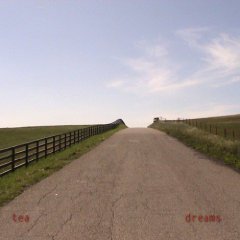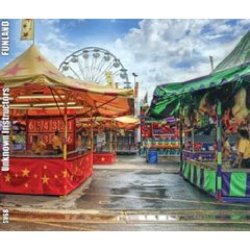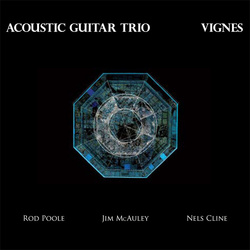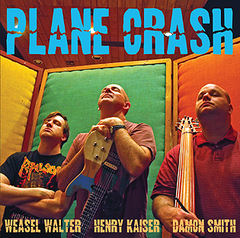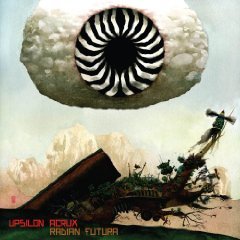Tea, “Dreams” (www.teaproductions.com)
Whether you prefer to chill like a plate of raw octopus, a Prestone julep or a cadaver on a midnight sidewalk, Tea have got your soundtrack. The Los Angeles-based duo of French guitarist Franck Balloffet and local drummer-keysman Phil Bunch slither into your cabana with Euro-style world groove topped by a few select African and American vocalists murmuring insistently in languages you don’t understand, which is just the way you want it.
Tea’s second album goes down best when it’s traveling nowhere nicely. The spacious “Bilobela” thumps with an African tickle; keyboard god Brian Auger (your servant on three tunes) massages his Hammond just as if it were your tensed-up sternocleinomastoids. Leave it to a seductress named Chana to whisper you into dreamland amid cooled-out shuffles on “Dis Moi” and “Desirable” -- can one sleep and sway at the same time? As a saxophone wafts along, “Haunty” thuds a droning cha-cha and Steve Ngondo coos yei-yeas till the Xanax kicks in. By the time the busy bongos and disco bump-ding of “Lisapo” stir up a breeze, you’re presumably refreshed and primed for dancefloor promiscuity.
“Dreams” also conjures a couple of supremely annoying pop-reggae confections -- “Verité” sports whiny vox from Ngondo, and “Envie” inflicts squeaky synth accents that’ll make you want to stick icepicks in your ears. They deserve to be huge hits.
The weight that keeps the whole thing from floating away like a party balloon is André Manga’s glossy, stony electric bass. The gooshy guitar chords, misty echo and general insubstantiality (“Dreams” is truth in advertising) do occasionally raise the question of how much lotion is really necessary; the opening “Vibration” is as bland as a mound of taro paste. But something about the record says art rather than fellatio. Maybe it taps some subliminal electronic studio magic that disables critical faculties. But who needs faculties?
Unknown Instructors, “Funland” (Smog Veil)
Underground superimprovisers Mike Watt, George Hurley and Joe Baiza resurface with the vocals/poetry of Dan McGuire and David Thomas for a third turn, and like that pot o’ good slop you left simmering all day, they keep getting more fully blended.
The Minutemen rhythm section of Watt and Hurley have lost none of their chemistry -- Hurley’s jazzy drum drive flows with such effortless complexity that he sometimes sounds as if he’s wrestling himself in his sleep, the groove part of his brain having achieved second nature as he locks in with Watt’s fundamental Jah Wobble/Noel Redding/Willie Dixon bass lines. The guitar of Baiza -- who grew up alongside them in the noisetwisty Saccharine Trust, the bluesfunky Universal Congress Of, etc. -- makes for such an appropriate complement that you forget they’ve been jamming together on and off for four years instead of constantly for 30. He keeps things fresh with an array of sounds: slow-cycling feedback indistinguishable from a bass clarinet on “Those Were the Days,” space bleeps on “Door of No Return,” slap-slides on “Chicago, Illinois.”
The biggest surprise is Thomas, whose voice hasn’t sounded so much like a pure instrument since his early Pere Ubu days; he acts as an abstractionist rather than a word guy, especially impressive with his tremolo vocal and hellhound harmonica on the spooky “Afternoon Spent at the Bar, Sunny.” McGuire is a fine convoluted postbeat poet with a dark, manly delivery who subsumes his language skills to the overall mess, letting you pick an occasional phrase (“Transience makes everything possible”) out of the often noisy/random murk, like a campfire of oblique meaning flickering between trees.
Unknown Instructors made this for no other reason than they wanted to. Not a bad idea once in a while. Keeps the cultural scalpel from dulling.
Acoustic Guitar Trio, “Vignes” (Long Song)
The 2007 murder of guitarist Rod Poole makes everything he recorded more precious; good thing he documented some of his shows. Here we get three improvisations with fellow guitarists Nels Cline and Jim McAuley from a live 2003 concert in downtown L.A.
The trio treat their instruments with great delicacy and little respect for what some luthier imagined: They stick things between the strings, pluck and slap in unaccustomed ways. Poole sometimes applies a bow to his ax, which I think is microtonally fretted.
If they won’t let a guitar be a guitar, they also won’t allow their music to be entirely human. I hear the dense fall of dry leaves, a flower opening in fast motion, the textures of raw silk, the abrasion of rusty barbed wire, the resonance of rotted wood, the drone of cicadas, the creaking of a giant iron door. On the human side, there are running feet and lullaby arms. The densities, rhythms and volume vary from moment to moment. The mood is one of calm concentration and mutual respect. The three play as an ensemble, so you usually can’t tell who’s who. All are masters who know exactly what kinds of sounds they can produce. (They are not experimenting.)
Time goes away.
Henry Kaiser-Weasel Walter-Damon Smith, “Plane Crash” (UgExplode)
When the vet avant guitarist Henry Kaiser goes unplugged -- pluck-pinging, scrambling, wandering in a daze amid Weasel Walter’s percussive playpen minefield -- this trio’s improv aesthetic aligns pretty well with the Acoustic Guitar Trio’s. That’s half the time here.
But since Kaiser can channel electricity’s naked howl in ways few since Hendrix has managed, it’s the other half of the album, with Walter punishing a full kit and Damon Smith working the wide range of his seven-string electric bass, that makes the nastiest impact. Kaiser’s guitar screams in pain, streaks and explodes like a Roman candle, bloops in outer space, clangs in Beefheartian protest, skids around like a mustang in an ice rink. Walter and Smith, meanwhile, lumber on the low ground and throw blustery punches like Sonny Liston of yore, applying the lessons of ‘60s free jazz to a filthier and less agrarian age.
The premise of Richard Gehr’s liner notes is that the three got in a plane, flew high, crashed and perished. And they did indeed rise to some crazy places, even if they didn’t literally die trying.
Upsilon Acrux, “Radian Futura” (Cuneiform)
Upsilon Acrux’s booklet notes thank Nels Cline and Weasel Walter, but I don’t think there’s much improvising here. Active in various configurations for a decade, the SoCal quintet condense hundreds of ideas into an instrumental supercollider and keep them vibrating on the brink of fission. The result is scary.
The compositions -- spun with tight intensity by two guitars, synth, bass and drums -- link and overlap fragments from all over the musicsphere: Zappa carnivalations, Television accelerations, science polka, metallic fury, distant reggae. It’s nervous, sparky, often dissonant but more listenable than you’d think, even the 28-minute “Transparent Seas,” a work of symphonic scope spanning from switchback blasts to crushed nobility, with an elegant waltz in the middle so you can catch your breath. (I thought it might be possible for the group to perform without sheet music till I heard that one.)
Strong cover art, funny song titles (“Keeping Rice Evil”) -- it’s hard to fault Upsilon Acrux except to wonder why they limit their audience to smart folks obsessed with metal/punk/art imaginings by fringineers such as the Locust, Behold . . . the Arctopus (both thanked in the notes), Arsis and Carl Stalling. Most of us come to music when we want to get drunk and screw; Paul Lai and his cabal get out their axes when they want to drink espresso and do calculus. Takes all kinds. Fortunately.

